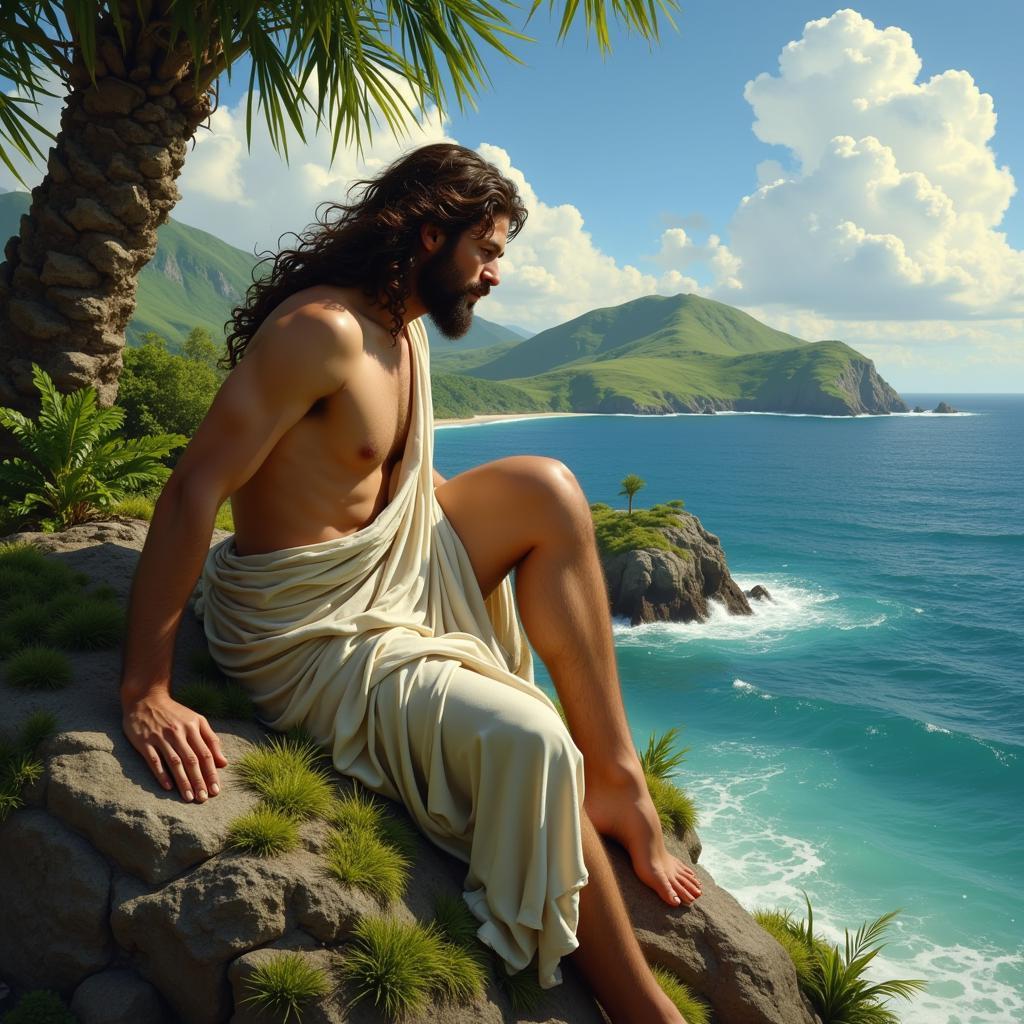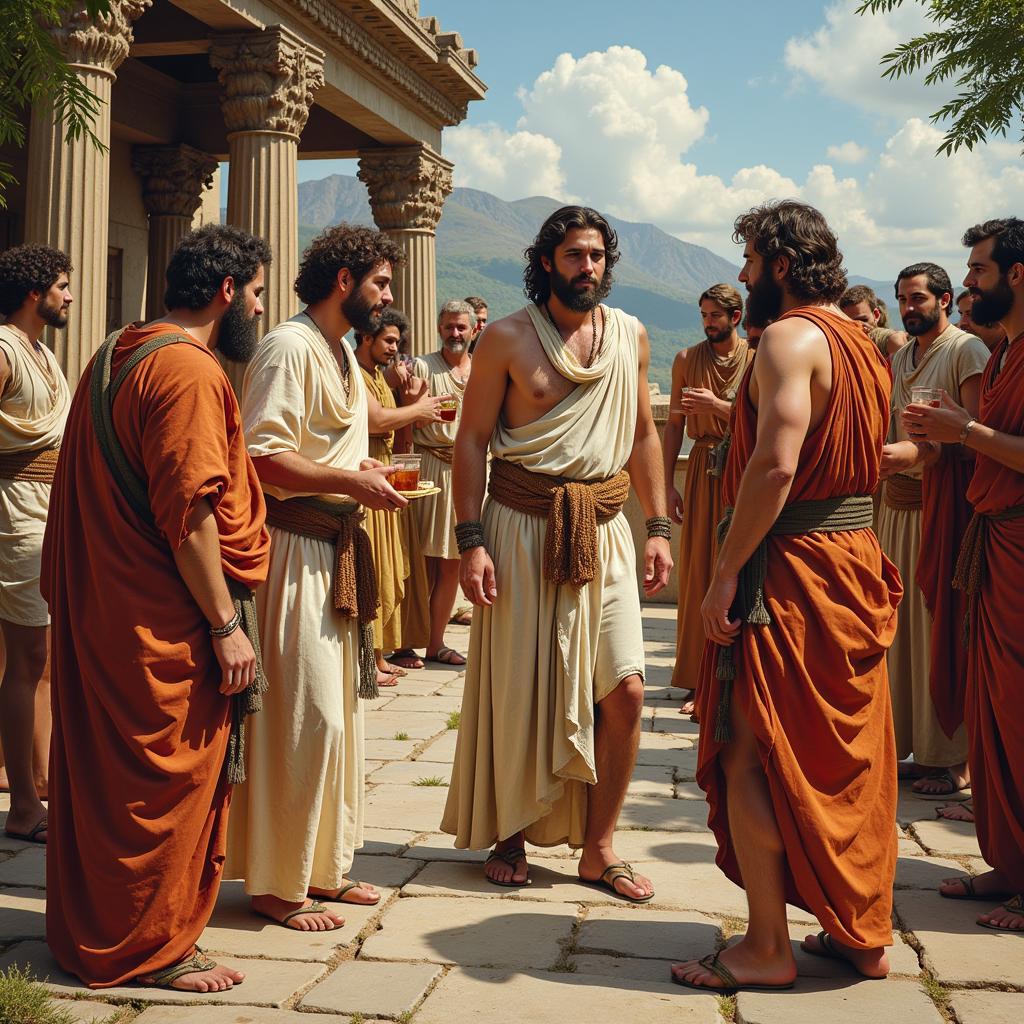The Odyssey, Homer’s epic poem, isn’t just a thrilling adventure story; it’s a deep exploration of ancient Greek culture. One of its most prominent themes is hospitality, known as xenia in ancient Greek. But How Is Hospitality Shown In The Odyssey? Let’s delve into the poem’s intricate world and uncover the nuanced ways hospitality shapes Odysseus’s journey.
The Sacred Bond of Xenia
In ancient Greece, xenia wasn’t just about being polite; it was a deeply ingrained social and religious obligation. Hosts were expected to provide travelers with food, shelter, and protection, no questions asked. In return, guests were expected to be respectful, not overstay their welcome, and offer gifts if they had them. This reciprocal relationship was believed to be under the watchful eye of Zeus, the king of the gods, who protected travelers and punished those who violated the laws of hospitality.
Odysseus: Guest and Host
Odysseus experiences both sides of xenia throughout his arduous journey. Shipwrecked and stripped of his crew, he relies on the kindness of strangers for survival. On the island of Calypso, the nymph offers him immortality in exchange for staying with her. While this may seem like generous hospitality, it becomes clear that Odysseus is a prisoner, longing for home and refusing to betray his marriage vows.
 Calypso Holding Odysseus Captive
Calypso Holding Odysseus Captive
When Odysseus finally returns to Ithaca, he finds his own home besieged by suitors vying for his wife Penelope’s hand. Disguised as a beggar, he experiences firsthand the suitors’ disrespect for xenia as they squander his family’s wealth and threaten his son Telemachus. This violation of hospitality fuels Odysseus’s rage and ultimately leads to his bloody revenge.
Contrasting Examples of Hospitality
Throughout The Odyssey, Homer contrasts different examples of hospitality to highlight its significance. The Phaeacians, led by King Alcinous, exemplify ideal hosts. They welcome Odysseus, a complete stranger, with open arms, providing him with a feast, entertainment, and a safe passage home. This act of generosity earns them the gods’ favor and reinforces the importance of upholding xenia.
 Odysseus Welcomed by the Phaeacians
Odysseus Welcomed by the Phaeacians
In stark contrast, the Cyclops Polyphemus embodies the antithesis of hospitality. When Odysseus and his men seek shelter in his cave, Polyphemus imprisons and devours them, violating the sacred bond of xenia. This act of barbarity brands him a monster and ultimately leads to his downfall.
The Enduring Significance of Hospitality
The Odyssey’s exploration of hospitality transcends its ancient Greek setting. The poem reminds us of the importance of compassion, empathy, and welcoming others, especially those in need. It highlights how acts of kindness can have far-reaching consequences, shaping destinies and influencing the fates of individuals and nations.
Even today, the principles of xenia resonate deeply. In a world often characterized by division and distrust, The Odyssey serves as a timeless reminder of the power of hospitality to bridge divides, foster understanding, and create a more humane world.
FAQs
1. What is the most famous example of hospitality in The Odyssey?
While there are many examples, the Phaeacians’ treatment of Odysseus is often cited as the epitome of xenia.
2. How does Odysseus’s own hospitality compare to that of other characters?
Odysseus is shown to be a gracious host in flashbacks to his time in Ithaca before his journey. He upholds the laws of xenia even as he faces numerous challenges on his voyage.
3. What are the consequences of violating xenia in The Odyssey?
Characters who violate xenia, like the suitors and Polyphemus, face severe consequences, including the wrath of the gods and ultimately, their demise.
4. How does The Odyssey’s portrayal of hospitality relate to modern society?
The poem’s themes resonate even today, reminding us of the importance of kindness, empathy, and welcoming others, especially in an increasingly interconnected world.
5. What can we learn from The Odyssey’s exploration of hospitality?
The Odyssey teaches us that generosity and compassion are not signs of weakness but rather strengths that can forge bonds, overcome adversity, and ultimately lead to a more just and compassionate world.
Need Help Planning Your Own Odyssey?
Contact us at Phone Number: 02437655121, Email: [email protected] or visit us at 298 Cau Dien St., Minh Khai Ward, Bac Tu Liem District, Hanoi, Vietnam. Our 24/7 customer service team is here to assist you.